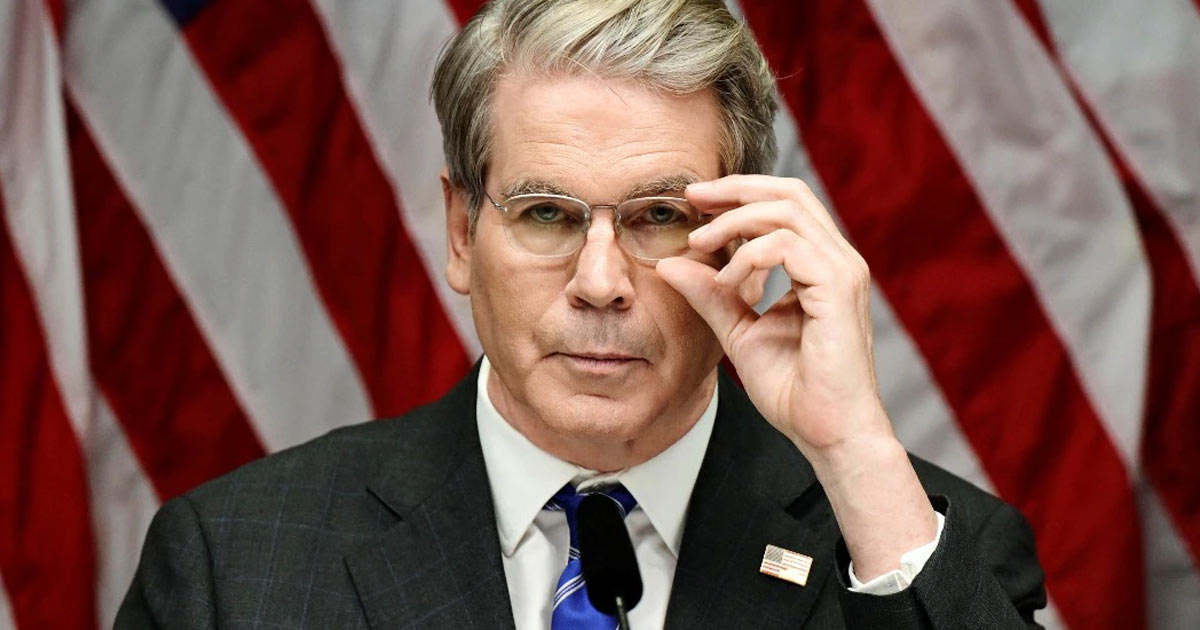As trade tensions between the United States and Communist China intensify, President Donald Trump’s administration has called on the International Monetary Fund (IMF) and World Bank to take a tougher stance against Beijing’s economic manipulation and preferential treatment within global financial institutions.
The move marks a new front in the U.S.–China standoff, shifting from tariffs to a broader confrontation over global trade rules and institutional influence, as both nations vie for dominance in the post-pandemic economy.
Bessent: “End Support for China”
In an October 15 statement, U.S. Treasury Secretary Scott Bessent urged the IMF to strengthen its economic oversight with “objectivity and evenhandedness.”
He also called on the World Bank to stop providing development loans to China, which he argued should no longer qualify for low-interest financing as the world’s second-largest economy.
“This must include ending support for China and shifting staff and administrative resources to countries where development needs are most acute,” Bessent said.
He pressed the World Bank to enforce its “graduation policy,” prioritizing poorer and less creditworthy nations over powerful economies that continue to exploit loopholes in the system.
Bessent also criticized China’s state-owned enterprises (SOEs) for distorting competition, urging the World Bank to “curb anti-competitive procurement practices” and to ban entities that “do not operate on a commercial basis.”
China Fires Back, Accuses U.S. of “Undermining Multilateralism”
In a swift response, the Chinese Communist Party accused Washington of “undermining the rules-based multilateral trading system.”
China’s Ministry of Commerce threatened to retaliate through the World Trade Organization (WTO).
The ministry claimed that since President Trump took office in 2025, the United States has “violated international trade norms” and said Beijing would intensify its use of WTO dispute mechanisms against the U.S.
Critics Say Beijing Exploits Global Finance
While China continues to describe itself as a “developing country” and a “climate-transitioning economy,” critics argue that Beijing’s status is a strategic deception allowing it to secure cheap loans and global influence far beyond its economic standing.
“This positioning allows Beijing to nominally be put alongside less developed nations, while in reality gaining access to resources and influence far beyond the developing country’s standards,” said U.S.-based economist Davy J. Wong.
Taiwanese international affairs scholar Sun Kuo-hsiang noted that China falls under the World Bank’s International Bank for Reconstruction and Development (IBRD) category, which typically lends at near-market rates.
Still, Beijing routinely packages its requests as “climate” or “public health” projects to qualify for international approval.
“Projects such as electric vehicle subsidies, renewable energy, and urban sewage systems have all been incorporated into the ‘climate-friendly’ lending framework,” Wong said, adding that China’s coal-heavy energy grid negates many of its supposed carbon reductions.
Beijing’s Control Over Critical Minerals
Analysts warn that China’s dominance over rare earths and other critical minerals, including lithium, nickel, graphite, gallium, and germanium, has become a strategic weapon in global supply chains.
“When Europe and the United States attempt decoupling, Beijing can use these raw materials as leverage for strategic countermeasures,” Wong said.
Bessent urged the World Bank to diversify mineral supply chains and support alternative sourcing.
“We welcome the steps the Bank is taking to devise a critical minerals strategy, and expect it to emphasize investments and technical assistance to promote diversified and resilient supply chains,” he said.
Wong suggested that the G7 should form a “Critical Mineral Alliance” to build redundancy, increase transparency, and reduce dependency on China’s mineral monopoly.
IMF Oversight and Industrial Policy
Bessent also called on the IMF to focus on macroeconomic and financial stability, warning against mission drift into “areas beyond the IMF’s expertise, like climate and gender.”
“The IMF should not shy away from asking difficult questions,” he said, urging stronger scrutiny of industrial policies in large economies such as China that distort markets and cause global spillover effects.
He requested that China’s trade and currency practices be included in the IMF’s Comprehensive Surveillance Review, last updated in 2021.
According to Sun, that request aligns with new IMF frameworks introduced in 2024 that incorporate industrial policy into surveillance reviews — giving Washington a procedural foundation for holding Beijing accountable.
U.S. Leverage and Limits
While China’s influence within global institutions has grown, the United States still holds significant power, including a de facto veto at the IMF, where it controls 16.5% of the vote.
However, Wong cautioned that Bessent’s push is “largely symbolic” and faces resistance from Europe, the Global South, and developing nations aligned with China.
“The Treasury Secretary’s call is primarily a symbolic political gesture, intended to shape international public opinion and urge the IMF to be more transparent and symmetrical in its oversight of major economies,” Wong said.
“However, it lacks the power to actually overturn the existing operating mechanism.”
Both Wong and Sun agreed that Washington and Beijing are now entering a long-term rules-based standoff, one that goes beyond tariffs and touches the foundations of international finance and supply chain control.
“The United States and China are poised to move from a tariff war to a protracted standoff over rules and supply chains,” Wong said.

Our comment section is restricted to members of the Slay News community only.
To join, create a free account HERE.
If you are already a member, log in HERE.